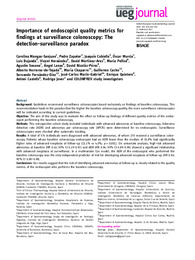Título :
Importance of endoscopist quality metrics for findings at surveillance colonoscopy: The detection-surveillance paradox |
Autor :
Mangas-Sanjuan, Carolina
Zapater, Pedro
Cubiella, Joaquín
Murcia, Oscar 
Bujanda, Luis 
Hernández, Vicent
Martínez - Ares, David 
Pellisé, María
Seoane, Agustín
Lanas, Angel
NICOLÁS-PÉREZ, DAVID 
Herreros-de-Tejada, Alberto
Chaparro, María 
Cacho, Guillermo
Fernández-Díez, Servando
Marín-Gabriel, José Carlos
Quintero, Enrique
Castells, Antoni 
JOVER, RODRIGO  |
Editor :
Wiley Online Library |
Departamento:
Departamentos de la UMH::Medicina Clínica |
Fecha de publicación:
2018-05 |
URI :
https://hdl.handle.net/11000/30936 |
Resumen :
Background: Guidelines recommend surveillance colonoscopies based exclusively on findings at baseline colonoscopy. This recommendation leads to the paradox that the higher the baseline colonoscopy quality, the more surveillance colonoscopies will be indicated according to current guidelines.
Objective: The aim of this study was to evaluate the effect on follow-up findings of different quality metrics of the endoscopist performing the baseline colonoscopy.
Methods: This retrospective cohort study included individuals with advanced adenomas at baseline colonoscopy. Adenoma detection rate (ADR) and adenomas per colonoscopy rate (APCR) were determined for 44 endoscopists. Surveillance colonoscopies were checked after systematic tracking.
Results: A total of 574 individuals were diagnosed with advanced adenomas, of whom 270 received a surveillance colonoscopy. Patients whose baseline colonoscopy endoscopist had an ADR lower than the median of 33.8% had significantly higher rates of advanced neoplasia at follow-up (13.1% vs 4.0%; p = 0.001). On univariate analysis, high-risk advanced adenomas at baseline (HR 0.43; 95% CI 0.19-0.97) and ADR (HR 0.94; 95% CI 0.89-0.99) showed a significant relationship with advanced neoplasia at surveillance. In a multivariate Cox model, the ADR of the endoscopist who performed the baseline colonoscopy was the only independent predictor of risk for developing advanced neoplasia at follow-up (HR 0.94; 95% CI 0.89-0.99).
Conclusions: Our results suggest that the risk of identifying advanced adenomas at follow-up is closely related to the quality metrics of the endoscopist who performs the baseline colonoscopy.
|
Palabras clave/Materias:
Colon cancer
adenoma detection rate
colonoscopy
colonoscopy quality metrics
surveillance |
Tipo documento :
application/pdf |
Derechos de acceso:
info:eu-repo/semantics/openAccess
Attribution-NonCommercial-NoDerivatives 4.0 Internacional |
DOI :
https://doi.org/10.1177/2050640617745458 |
Aparece en las colecciones:
Artículos Medicina Clínica
|
 La licencia se describe como: Atribución-NonComercial-NoDerivada 4.0 Internacional.
La licencia se describe como: Atribución-NonComercial-NoDerivada 4.0 Internacional.
.png)
